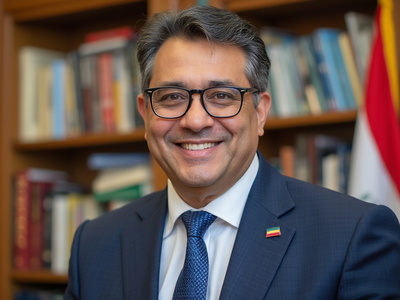
Chaves Rally Outside Legislative Assembly Highlights Political Tensions in Costa Rica
Supporters rally for President Rodrigo Chaves as he faces potential legal challenges and renewed political scrutiny.
On May 5, 2025, a rally outside Costa Rica’s Legislative Assembly drew hundreds of supporters of President Rodrigo Chaves, coinciding with his entrance to deliver a significant address to the assembly.
This gathering, taking place in the Plaza de la Democracia, reflected the ongoing political dynamics and potential tensions surrounding the Chaves administration.
Chaves, who arrived shortly after 3 PM with his wife Signe Zeikate and cabinet members, appeared to seek encouragement from his followers before addressing the legislature.
This follows months of increasing scrutiny regarding his leadership and impending legal challenges, including potential accusations of criminal conduct connected to allegations of collusion.
Chaves' supporters, many of whom were older adults clad in white shirts featuring jaguar symbols, expressed their solidarity, chanting slogans such as "¡No está solo!" (You are not alone) and "¡Sí se puede!" (Yes, it can be done).
The scene was reminiscent of a lively sport event, with attendees gathering around a massive screen broadcasting the presidential speech.
As Chaves spoke inside the assembly, his supporters reacted as if cheering for a football match, celebrating each of his statements vocally while deriding opposing figures such as Rodrigo Arias, the president of the Legislative Assembly.
The atmosphere outside was charged, with animators inciting crowd responses against opponents and praising Chaves.
Noteworthy among the attendees were Laura Fernández, the former Minister of the Presidency, and Francisco Gamboa, a former Finance Minister, who garnered significant attention and support from the crowd.
Fernández was described by supporters as a potential future presidential candidate, while Gamboa emphasized the need for a stronger legislative presence to support Chaves' governance.
The rally’s organization suggested a planned effort to mobilize supporters, with reports indicating that buses transported attendees from various regions, including San Carlos and Guanacaste.
The atmosphere was celebratory, enhanced by musical performances, although the political rhetoric was pointedly critical of Chaves' opponents.
Chaves’ speech inside the assembly emphasized the need for profound transformation within the Costa Rican state, articulating a vision that mirrors authoritarian leaders in Central America, according to political observers.
The rally also featured a handout from the Movimiento Jaguares Nacionales, requesting Chaves to consider taking a seat as a deputy legislator, underscoring a drive for consolidated control among Chaves' supporters.
As night fell, the gathering reflected both a celebration of loyalty and an illustration of the heightened political polarization in Costa Rica, concluding with a performance of 'El Rey,' a song tinged with themes of resilience and struggle, drawing historical parallels within the region's political landscape.
This gathering, taking place in the Plaza de la Democracia, reflected the ongoing political dynamics and potential tensions surrounding the Chaves administration.
Chaves, who arrived shortly after 3 PM with his wife Signe Zeikate and cabinet members, appeared to seek encouragement from his followers before addressing the legislature.
This follows months of increasing scrutiny regarding his leadership and impending legal challenges, including potential accusations of criminal conduct connected to allegations of collusion.
Chaves' supporters, many of whom were older adults clad in white shirts featuring jaguar symbols, expressed their solidarity, chanting slogans such as "¡No está solo!" (You are not alone) and "¡Sí se puede!" (Yes, it can be done).
The scene was reminiscent of a lively sport event, with attendees gathering around a massive screen broadcasting the presidential speech.
As Chaves spoke inside the assembly, his supporters reacted as if cheering for a football match, celebrating each of his statements vocally while deriding opposing figures such as Rodrigo Arias, the president of the Legislative Assembly.
The atmosphere outside was charged, with animators inciting crowd responses against opponents and praising Chaves.
Noteworthy among the attendees were Laura Fernández, the former Minister of the Presidency, and Francisco Gamboa, a former Finance Minister, who garnered significant attention and support from the crowd.
Fernández was described by supporters as a potential future presidential candidate, while Gamboa emphasized the need for a stronger legislative presence to support Chaves' governance.
The rally’s organization suggested a planned effort to mobilize supporters, with reports indicating that buses transported attendees from various regions, including San Carlos and Guanacaste.
The atmosphere was celebratory, enhanced by musical performances, although the political rhetoric was pointedly critical of Chaves' opponents.
Chaves’ speech inside the assembly emphasized the need for profound transformation within the Costa Rican state, articulating a vision that mirrors authoritarian leaders in Central America, according to political observers.
The rally also featured a handout from the Movimiento Jaguares Nacionales, requesting Chaves to consider taking a seat as a deputy legislator, underscoring a drive for consolidated control among Chaves' supporters.
As night fell, the gathering reflected both a celebration of loyalty and an illustration of the heightened political polarization in Costa Rica, concluding with a performance of 'El Rey,' a song tinged with themes of resilience and struggle, drawing historical parallels within the region's political landscape.










